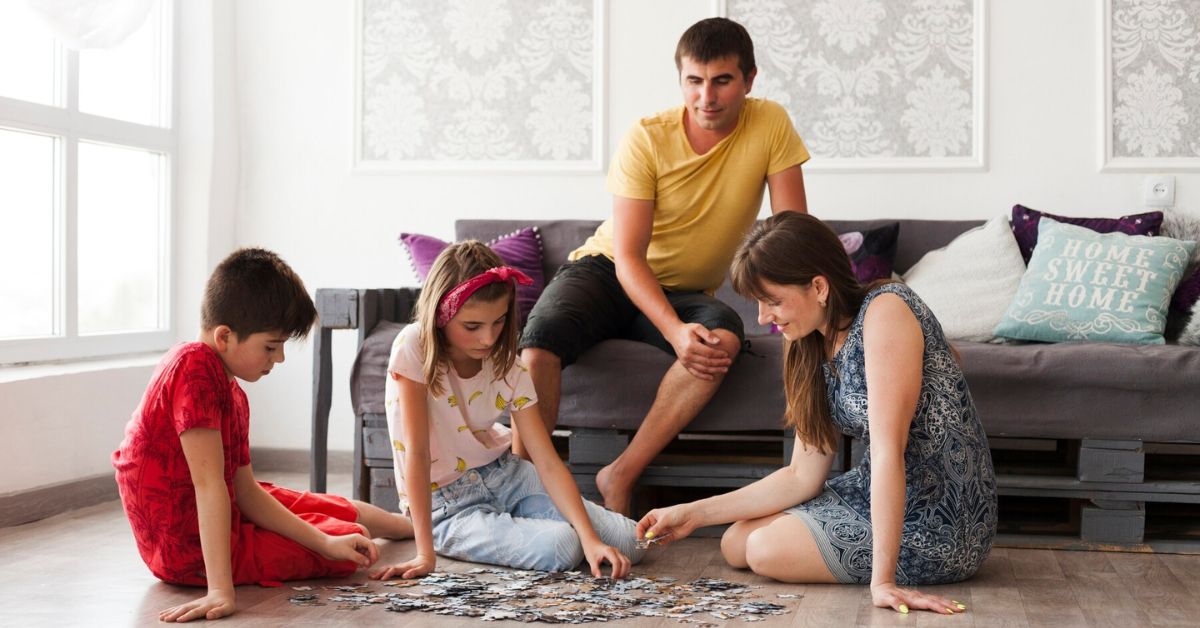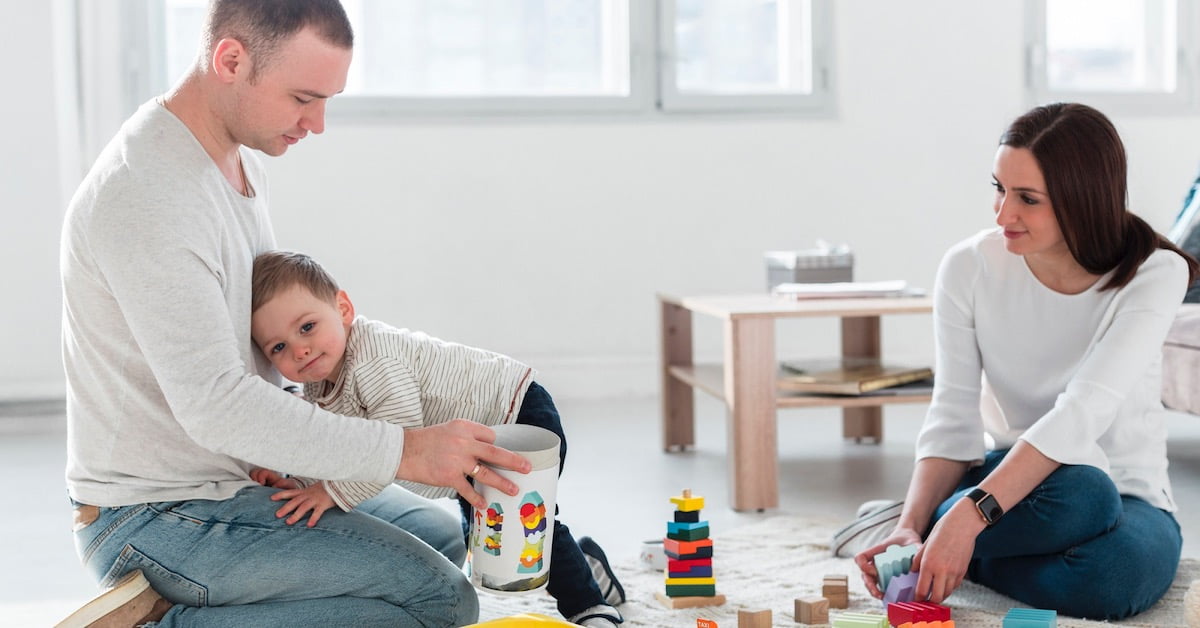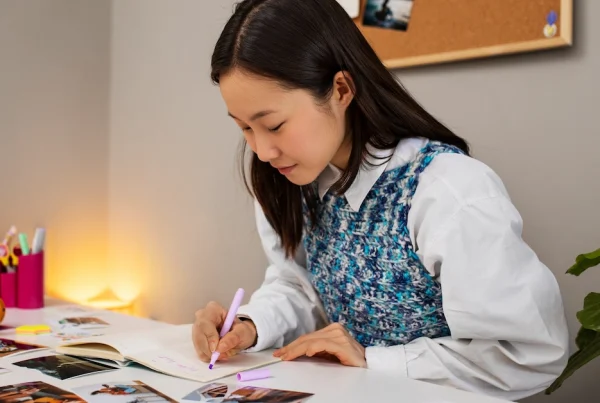Everyone has a creative streak, but it often needs a little nudge or the right environment to fully bloom. When we create opportunities for creative expression, we can open this potential and reap the benefits it offers. Creativity not only fuels imagination but also enhances problem-solving skills, critical thinking, and emotional expression. Engaging in creative activities helps children develop a sense of self and builds their confidence as they discover their unique talents and abilities.
Parents play a vital role in building upon creativity at home. Through participating in creative activities together, parents can strengthen their bond with their children while providing the support and encouragement needed to explore new ideas and perspectives. This shared creative time not only enriches the parent-child relationship but also offers valuable opportunities for parents to observe and understand their child’s evolving interests and abilities. Learn more information about all indoor activities for kids you can do with your children below!
Is It Possible to Have Fun with Your Children From Home?
Absolutely! Having fun with children at home is not only possible but can also be deeply rewarding. There are plenty of indoor activities that bring joy while helping kids learn and grow, keeping both older and younger children entertained and connected.
Parents can set aside time for arts and crafts, where children can paint, draw, or build using everyday items.
These fun indoor activities spark creativity and allow for meaningful moments of free play. Even with just a few toys, parents can design imaginative games that keep kids engaged for hours.
Cooking or baking together is another wonderful way to create memories. It teaches valuable life skills, encourages teamwork, and ends with a treat everyone can enjoy.
Simple home-based science experiments can also be exciting, offering hands-on discovery that makes learning fun, even when kids feel stuck indoors.
To add variety, parents can set up a mini indoor or backyard camping experience, complete with storytelling or a pretend fire.
Board games, virtual playdates, and even a simple indoor obstacle course can bring energy and laughter to the day. Balancing structured activities with moments of free play ensures that children have both fun and freedom to explore.
With creativity and intention, family time at home becomes an opportunity to bond, learn, and enjoy each other’s company.
Benefits of At-home Creative Activities
Engaging kids in creative at-home play offers lasting benefits for their growth and development. From fun indoor activities to learning opportunities, these moments become meaningful experiences that shape their confidence and skills.
1. Reduce Distraction and Constraints from Outside
Indoor activities for kids create a calm environment where distractions from the outside world don’t interfere.
Whether it’s rainy day activities, a quick dance routine, or simple games, children can focus and enjoy themselves within the house.
Even when there’s only one child, structured activities help them stay engaged and inspired. This safe and controlled space makes it easier for kids to follow directions while still having fun.
2. Enhance Child’s Cognitive Development
Creative activities for kids, like puzzles, crafts, and read aloud sessions, sharpen memory, attention, and critical thinking.
Using materials such as pipe cleaners and googly eyes sparks imagination while improving problem-solving skills.
These indoor activities provide both entertainment and education, ensuring kids learn while they play. Over time, even older ones gain inspiration and confidence as they discover that learning can be fun.
3. Improve Their Problem-Solving Skills
When kids grab materials to build, paint, or invent, they learn how to approach challenges with creativity.
For example, designing crafts with pipe cleaners or planning a treasure map game helps them think critically.
These indoor activities for kids teach them to adjust strategies and recognize that every mistake is a chance for growth. Problem-solving becomes second nature, providing a foundation that will matter throughout life.
4. Strengthen Family Bonds
Fun indoor activities bring parents, siblings, and friends together to share laughter and creativity.
Playing card games, trying out a dance routine, or setting up group challenges lets imaginations run wild while strengthening relationships.
From the beginning, these shared moments build trust, cooperation, and joy within the family. When everyone joins in, older ones can help younger kids, making the house a true space for connection.
5. Promote Emotional Well-being
At-home creative activities give kids an outlet to express their feelings through play, art projects, or dancing.
These activities reduce stress and bring happiness, offering daily physical activity that supports both body and mind.
Completing small tasks, like crafts or read aloud storytelling, can boosts confidence and self-esteem. Most importantly, indoor activities remind children that joy, inspiration, and balance can be found right at home.
Read also: 5 Life Skills for Early Childhood Development that Every Parent Should
Fun Activities for Kids Indoors of All Ages
Finding suitable activities for children across age groups can feel challenging, but with a little creativity, parents can discover indoor play ideas that are both enjoyable and enriching.
Whether it’s structured learning or letting their imaginations run wild, these fun ideas ensure that kids remain active, curious, and happy, even on bad weather days.
Below are engaging activities tailored to different stages of childhood that can easily be done at home.
1. Toddlers (Ages 1-3)
At this age, toddlers are full of energy and curiosity. They love to explore the world through touch, sound, and movement. Parents can choose safe and creative ways to encourage their development while keeping them entertained.
1. Engaging Sensory Play
Fill shallow bins with rice, pasta, or even shaving cream for a delightful sensory experience. Toddlers can scoop, pour, and squish while developing fine motor skills. Adding small soft object toys or treasures to uncover will provide hours of fun.
2. Creative Art
Introduce simple projects such as finger painting or drawing with jumbo crayons. Using construction paper and washable paints allows children to enjoy their first art project safely. These activities let them express themselves while also building coordination.
3. Interactive Learning
Sing nursery rhymes with motions, read picture books, or solve chunky puzzles. These moments foster early literacy and cognitive growth. For your first child, this stage lays the foundation for a lifelong love of learning.
4. Physical Play
Encourage activity with simple games like “Simon Says” or a mini indoor musical chairs round. For active fun, create a toddler-safe obstacle course with pillows or soft mats. This combines enjoyment with healthy physical activity.
Preschoolers (Ages 3-5)
Preschoolers thrive on discovery and love activities that let their imaginations run wild. They enjoy experimenting with materials, role-playing, and games that boost confidence and social skills.
1. Crafting and DIY Projects
Simple crafts like making handprint animals, sticker collages, or paper masks keep them busy and proud of their creations. Everyday materials can become something new in their hands. These activities help many kids build patience and creativity.
2. Playdough and Clay Modeling
Preschoolers love shaping clay into animals, pretend food, or favorite characters. This enhances fine motor skills and storytelling ability. A session with playdough often turns into joyful free time filled with imaginative worlds.
3. Simple Science Experiments
Mix baking soda and vinegar for fizzing fun, or plant seeds in small pots. These activities combine learning with discovery. Children also enjoy following along with simple YouTube videos designed for preschool experiments.
4. Interactive Storytelling and Role-Playing
Acting out stories or pretending to be chefs, doctors, or superheroes creates endless fun. Add props or costumes made from household items. This role-play strengthens communication skills and boosts self-confidence.
3. Primary School Children (Ages 6-10)
Children in this age group are developing sharper thinking and enjoy structured challenges. Activities should balance fun with skill-building, perfect for activities for 7-year olds indoors as well as slightly older children.
1. Advanced Craft Projects and DIY
Encourage more complex creations such as cardboard forts, DIY jewelry, or small model kits. Projects like these strengthen problem-solving and spatial reasoning. They also allow children to see the results of their hard work.
2. Cooking and Baking Together
Invite kids to join in making pizzas, smoothies, or cookies. This teaches life skills while also fostering teamwork. Cooking as a family creates memorable bonding moments that last.
3. Educational Games and Activities
Board games that require strategy or memory help sharpen the mind. Simple card games or setting up a household treasure hunt add excitement while teaching logic. Games like these keep kids engaged without relying on screens.
4. Science and Exploration
Hands-on experiments like building a baking soda volcano or creating a solar system model spark curiosity. Outdoor projects can also tie into lessons about nature. For extra fun, introduce challenges like balloon volleyball or star jumps to mix learning with physical activity.
Middle School Children (Ages 11-14)
Middle school children begin to seek a balance between independence and fun. They are developing their interests and enjoy activities that offer a sense of autonomy while allowing for creative exploration.
1. Hobbies and Skill Development
Encourage hobbies like painting, knitting, or playing an instrument. For tech-savvy children, editing YouTube videos or photography can be engaging. These hobbies often grow into lifelong passions.
2. Family Game Nights and Collaborative Projects
Gather for family puzzles, model building, or cooperative board games. Backyard fun with balloon volleyball or relay races adds more physical activity. These activities keep middle schoolers connected while still giving them freedom.
3. Creative Writing or Journaling
Encourage middle schoolers to start writing short stories, poems, or even keep a journal. This not only hones their writing skills but also provides a constructive outlet for their thoughts and emotions.
4. Critical Thinking and Coding
Middle schoolers can start exploring coding through interactive platforms such as Scratch or Roblox Studio. These activities combine creativity with logic and problem-solving, which are essential for building computational thinking skills.
High School Teenagers (Ages 15-18)
High school teenagers are at a stage where they crave independence and want to pursue their own interests. The key is providing them with activities that align with their passions while also preparing them for adulthood.
1. Advanced DIY Projects and Crafts
Teenagers with an interest in design, engineering, or hands-on projects can take on more advanced DIY tasks, such as building furniture from scratch, upcycling old clothes, or working with electronics. These activities allow them to express their individuality while developing useful life skills.
2. Exploring Creative Passions
Encouraging teens to explore photography, painting, or digital media can help them cultivate artistic talents. Many teens may enjoy editing videos for social media or learning graphic design skills, which could also serve as potential career pathways.
3. Cooking and Gourmet Experiences
Teens interested in food can experiment with gourmet cooking, learning how to prepare more complex dishes. This not only teaches self-sufficiency but also introduces them to different cuisines and cultures.
4. Volunteering and Entrepreneurial Projects
Encouraging teenagers to take up volunteer work in their community or start small entrepreneurial projects (such as selling handmade crafts or tutoring younger children) fosters responsibility, empathy, and leadership skills, preparing them for the challenges of adulthood.
5. Language Learning and Self-Development
Many high schoolers may be interested in expanding their knowledge by learning new languages through apps like Duolingo or Babbel. Encourage them to pursue activities that broaden their horizons and prepare them for future academic and career opportunities.
Read also: 5 Life Skills for Early Childhood Development that Every Parent Should Know
Partnering with Schools to Nurture Creativity
While fostering creativity at home is essential, partnering with a school that values and enhances this creative growth can take your child’s passion to the next level. Schools that encourage engaging and active learning provide a nurturing environment where children can explore their interests in greater depth and breadth. Sekolah Pelita Harapan (SPH) offers a curriculum that integrates creative thinking and hands-on learning, ensuring that children are not only academically proficient but also creatively enriched.
By choosing a school like SPH, parents can ensure that their child’s creativity is supported both at home and in the classroom, creating a well-rounded development that prepares them for future success. Creative activities at school complement home-based projects, providing a holistic approach to learning that engages children’s minds and imaginations.
Fostering creativity in children is a rewarding journey that involves encouragement, engagement, and the right environment. By integrating creative activities into daily routines and partnering with schools that prioritize creative development, parents can help their children unlock their full potential. Whether it’s through simple art projects or more complex digital creations, every creative endeavor contributes to a child’s growth, confidence, and joy.
To further enrich your child’s educational journey, consider exploring the SPH’s Learning Pathway. Sekolah Pelita Harapan (SPH) is renowned for its holistic approach to education, offering a rigorous curriculum that integrates academic excellence with character development.
SPH provides a nurturing environment where children can thrive academically, socially, and spiritually. By enrolling your child at SPH, you ensure they receive a well-rounded education that prepares them for success in all areas of life. Visit SPH’s website today to learn more about their unique programs and how they can benefit your child’s future!












